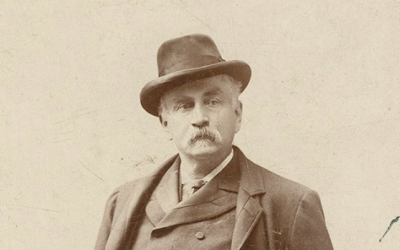The presidential election of 1884 was a memorable one. Democrat Grover Cleveland narrowly defeated Republican James G. Blaine after a scandal-filled campaign. The National Equal Rights Party, composed of woman suffragists, nominated Belva Lockwood of Washington, D.C., a lawyer and in 1879 the first woman admitted to practice before the U.S. Supreme Court. She was again nominated for president in 1888.
On January 31, 1885, Belva Lockwood arrived in Lincoln to deliver a scheduled lecture that evening. The following day the Nebraska State Journal carried a front-page interview in which Mrs. Lockwood briefly explained to Nebraskans her lecture activities, legal education and career, and her participation in the 1884 presidential campaign.
“The [Journal] reporter opened the interview by asking Mrs. Lockwood how long she had been in the lecture field. ‘I hardly know how to answer that,’ was the reply. ‘I am a professional woman and I have done more or less public speaking since I was fourteen years of age. I am interested in the temperance work, the peace and arbitration movement and the suffrage work, and I speak frequently on all these subjects . . . .
“‘How long have you been practicing law?’ ‘I was admitted to the bar in Washington about twelve years ago. I graduated at Genesee college, New York, and graduated from the National University of Law at Washington, May, 1873, and in September, 1873, was admitted to practice. . . . .
“‘What progress do you think woman’s suffrage is making?’ ‘I believe the agitation of the question has borne fruit and that it is now making a healthy, steady growth from a standpoint of practicality. More especially in the West I find women in many positions which they have not hitherto been allowed to fill. . . .
“‘What have you to say of the late presidential contest?’ ‘Of course, we don’t expect to accomplish anything by this [her 1884 try for the presidency] except to test the question. We want to get the question out of the realm of the vague and indefinite and theoretical and into the domain of the practical.'”



